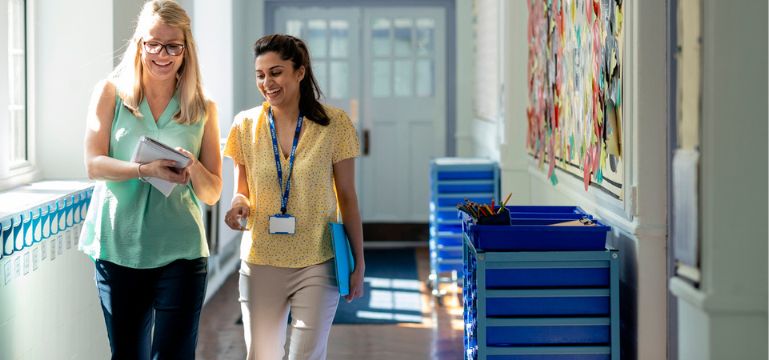Driving effective performance development through action research, collaboration and professional learning for all staff.

Quick links:
Information about the school
Llanhari Primary School is an English medium primary school situated in the village of Llanhari, in Rhondda Cynon Taf. Under the latest Welsh Index of Multiple Deprivation (WIMD) Llanharry is ranked 257 out of 1909, which places it amongst the 10-20% most deprived areas in Wales.
There are currently 178 pupils on roll, taught in 7 classes with a full-time nursery provision. Around 34% of pupils are eligible for free school meals. Approximately 15% of pupils have additional learning needs and 6% of pupils speak English as an additional language. All pupils are taught through the medium of English, with Welsh taught as a second language.
Context and background to the effective or innovative practice
Following the school’s involvement in an Education Development Trust (EDT) action research project in 2017 the school adopted a research informed approach for staff as part of performance management. Staff took ownership of these activities and brought ideas for their action research to the initial performance management meetings, giving them ownership and autonomy over their targets. At the end of the performance management cycle, they wrote detailed evaluations that followed the format provided by the Education Workforce Council (EWC).
In September 2022 the Schools as Learning Organisations (SLO) survey showed that post pandemic, the school needed to develop its collaboration within school and with the external environment. The head teacher had also researched the work of Chris Moyes looking at effective and continuous professional growth. A number of simple amendments were made.
Description of nature of strategy or activity
All staff, including support staff undertake a Professional Growth Plan prior to initial Performance Development meetings. This highlights the needs of the pupils in their class, the staff’s development needs and the initial ideas for action research. This was more detailed, and more pupil focused than our original plans. Staff were encouraged to collaborate in groups to undertake their research projects. For example, the intervention teacher and Year 6 teacher both looked at strategies for dyslexia, having control groups, target groups, sharing training and research opportunities. Support staff were included in this process and teamed up with class teachers or with one another to undertake their own research.
One of the key learnings from the research was the timing and frequency of the performance development cycle. Instead of running over 2 academic years (traditionally October – October) it now runs from September to July, allowing staff to complete the performance development cycle in the same academic year. Staff’s action research also became a regular focus of staff meetings. Staff are encouraged to talk about where they are with their research and share findings to date. This includes discussing baselines, training opportunities, visits to other schools etc. This keeps it relevant and at the forefront of professional development.
Another key change to the performance development process was the introduction of ‘purpose and audience’. Staff still complete the same action research evaluation based on the EWC format, but they now also present their findings at our stakeholder self-evaluation day. This is an opportunity to share practice with colleagues and governors, celebrating the work they have undertaken, and the difference made to our learners.
A key learning from the research showed that staff having small step achievable targets led to accelerated improvement. Staff take ownership of their professional development and actively seek out a wealth of opportunities. These have included international visits, for example our foundation phase leader visited Reggio in Italy to look at early years practice.
What impact has this work had on provision and learners’ standards?
This work has developed a collaborative culture in school. Staff regularly collaborate on professional learning, curriculum development and sharing of classroom practice through coaching.
It has had an impact on all staff’s attitude to professional learning and professional development. This includes learning from the external environment, an openness to international visits, requests for coaching support or team-teaching opportunities.
The professional growth plans ensure that professional development is aligned with school improvement priorities, leading to measurable improvements in pupil outcomes. The timings of the performance management cycle ensure that the needs of the current pupils are at the forefront of professional development.
How have you shared your good practice?
Through leading small working groups with other head teachers in the region.
Through presentations to the regional consortium.